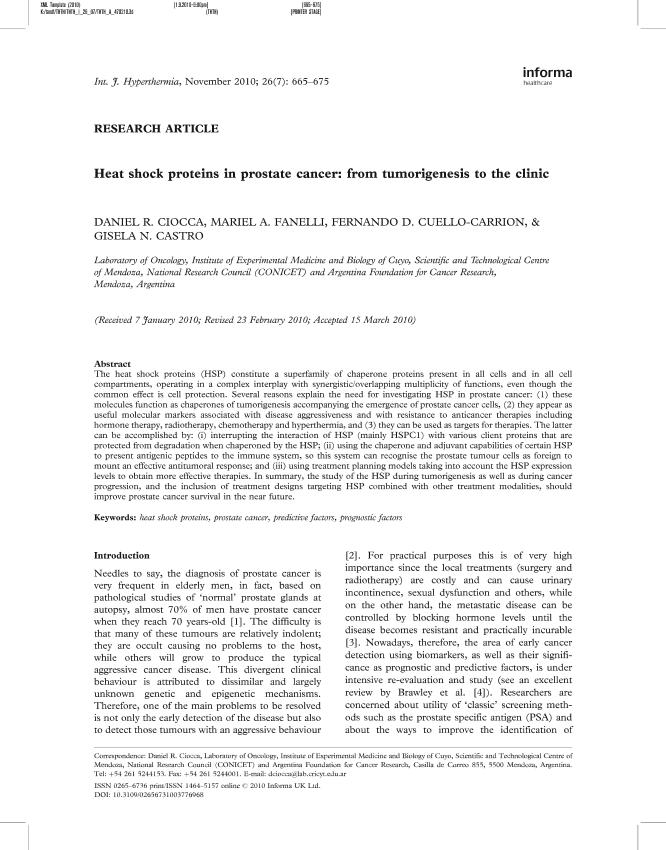Mostrar el registro sencillo del ítem
dc.contributor.author
Ciocca, Daniel Ramon

dc.contributor.author
Fanelli, Mariel Andrea

dc.contributor.author
Cuello Carrión, Fernando Darío

dc.contributor.author
Castro, Gisela Natalia

dc.date.available
2019-07-26T14:51:33Z
dc.date.issued
2010-12
dc.identifier.citation
Ciocca, Daniel Ramon; Fanelli, Mariel Andrea; Cuello Carrión, Fernando Darío; Castro, Gisela Natalia; Heat shock proteins in prostate cancer: From tumorigenesis to the clinic; Informa Healthcare; International Journal Of Hyperthermia; 26; 8; 12-2010; 737-747
dc.identifier.issn
0265-6736
dc.identifier.uri
http://hdl.handle.net/11336/80373
dc.description.abstract
The heat shock proteins (HSP) constitute a superfamily of chaperone proteins present in all cells and in all cell compartments, operating in a complex interplay with synergistic/overlapping multiplicity of functions, even though the common effect is cell protection. Several reasons explain the need for investigating HSP in prostate cancer: (1) these molecules function as chaperones of tumorigenesis accompanying the emergence of prostate cancer cells, (2) they appear as useful molecular markers associated with disease aggressiveness and with resistance to anticancer therapies including hormone therapy, radiotherapy, chemotherapy and hyperthermia, and (3) they can be used as targets for therapies. The latter can be accomplished by: (i) interrupting the interaction of HSP (mainly HSPC1) with various client proteins that are protected from degradation when chaperoned by the HSP; (ii) using the chaperone and adjuvant capabilities of certain HSP to present antigenic peptides to the immune system, so this system can recognise the prostate tumour cells as foreign to mount an effective antitumoral response; and (iii) using treatment planning models taking into account the HSP expression levels to obtain more effective therapies. In summary, the study of the HSP during tumorigenesis as well as during cancer progression, and the inclusion of treatment designs targeting HSP combined with other treatment modalities, should improve prostate cancer survival in the near future.
dc.format
application/pdf
dc.language.iso
eng
dc.publisher
Informa Healthcare

dc.rights
info:eu-repo/semantics/openAccess
dc.rights.uri
https://creativecommons.org/licenses/by-nc-sa/2.5/ar/
dc.subject
Heat Shock Proteins
dc.subject
Predictive Factors
dc.subject
Prognostic Factors
dc.subject
Prostate Cancer
dc.subject.classification
Medicina Critica y de Emergencia

dc.subject.classification
Medicina Clínica

dc.subject.classification
CIENCIAS MÉDICAS Y DE LA SALUD

dc.title
Heat shock proteins in prostate cancer: From tumorigenesis to the clinic
dc.type
info:eu-repo/semantics/article
dc.type
info:ar-repo/semantics/artículo
dc.type
info:eu-repo/semantics/publishedVersion
dc.date.updated
2019-06-10T21:22:51Z
dc.journal.volume
26
dc.journal.number
8
dc.journal.pagination
737-747
dc.journal.pais
Reino Unido

dc.journal.ciudad
Londres
dc.description.fil
Fil: Ciocca, Daniel Ramon. Consejo Nacional de Investigaciones Científicas y Técnicas. Centro Científico Tecnológico Conicet - Mendoza. Instituto de Medicina y Biología Experimental de Cuyo; Argentina
dc.description.fil
Fil: Fanelli, Mariel Andrea. Consejo Nacional de Investigaciones Científicas y Técnicas. Centro Científico Tecnológico Conicet - Mendoza. Instituto de Medicina y Biología Experimental de Cuyo; Argentina
dc.description.fil
Fil: Cuello Carrión, Fernando Darío. Consejo Nacional de Investigaciones Científicas y Técnicas. Centro Científico Tecnológico Conicet - Mendoza. Instituto de Medicina y Biología Experimental de Cuyo; Argentina
dc.description.fil
Fil: Castro, Gisela Natalia. Consejo Nacional de Investigaciones Científicas y Técnicas. Centro Científico Tecnológico Conicet - Mendoza. Instituto de Medicina y Biología Experimental de Cuyo; Argentina
dc.journal.title
International Journal Of Hyperthermia

dc.relation.alternativeid
info:eu-repo/semantics/altIdentifier/url/http://informahealthcare.com/doi/abs/10.3109/02656731003776968
dc.relation.alternativeid
info:eu-repo/semantics/altIdentifier/doi/http://dx.doi.org/10.3109/02656731003776968
Archivos asociados
